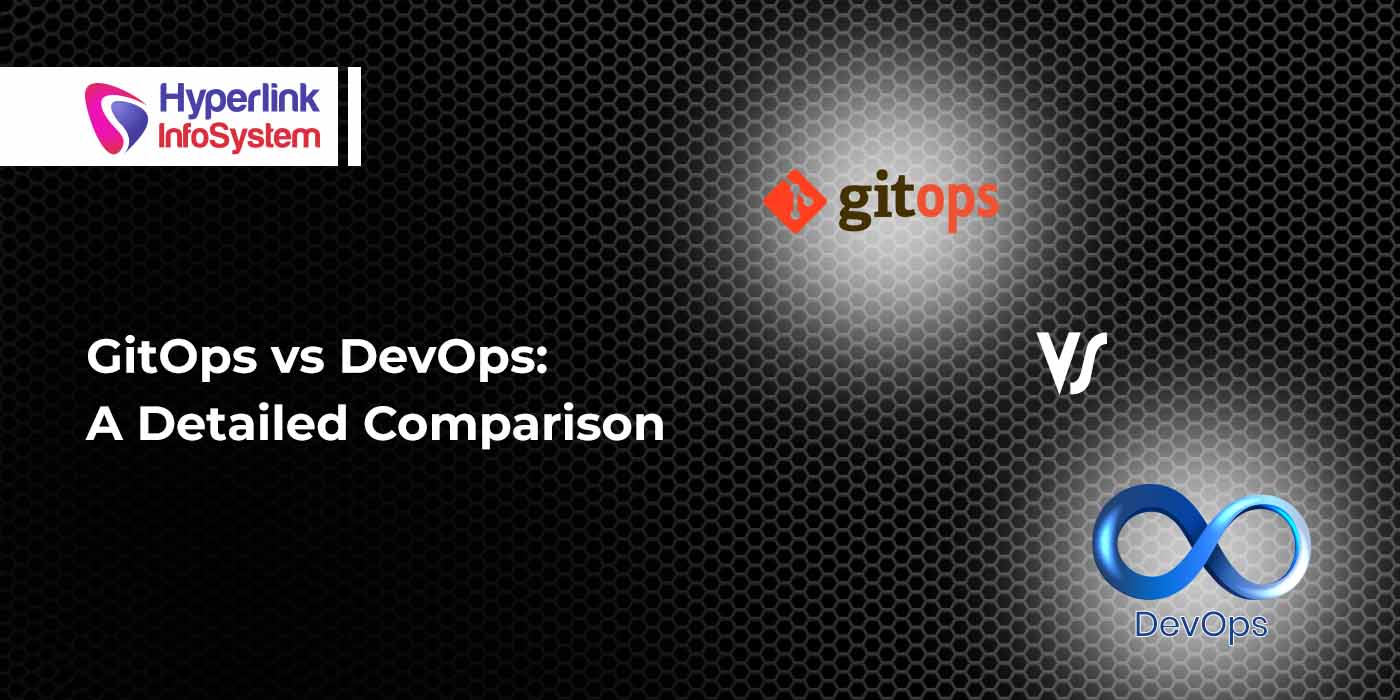Do you have a confusion to choose between GitOps and DevOps? Which one can be the better option for your organization and what values do both models add to the operational and development process?
People always try to figure out the best option with comparisons like
DevOps vs Agile or DevOps vs GitOps. You need to deeply understand DevOps and GitOps to know their role in the development. Let’s have an in-depth comparison of GitOps and DevOps that provides you with complete clarity to choose the correct option for the development.
Understanding DevOps
DevOps involves the use of tools and practices, it makes software development more efficient and provides the proper communication channel between operations and development teams.
DevOps is the combination of operational and development teams working together. This means
DevOps engineers have expertise in both development and operations. It results in the best outcome and fast development.
Data indicates that the DevOps market was valued at $6.78 billion globally in 2020 and is projected to grow to $57.90 billion by 2030.
Understanding GitOps
It is a model that operates and manages the infrastructure using open-source Git. It involves tracking the changes in the system and who made them.
GitOps uses Git as a single source of truth, to improve the collaboration between operations and development teams, which allows organizations to automate the deployment process. Because Git is used for deployment and operation, it allows you to revert to the previous commit and execute rollback easily.
Detail Comparison: DevOps vs GitOps
DevOps and GitOps have a lot of differences in terms of approach, tools, accuracy, flexibility, focus, correctness, and main goals.
1) Approach
The basic approach of DevOps is to collaborate with the development and operations team. Its sole focus is on bringing two groups together to work efficiently. This approach helps to create the communication channel that provides the platform for operators and developers to feedback to each other and pass information. It helps to improve the speed and efficiency of the development by avoiding miscommunication.
GitOps on the other hand has a different approach. It uses Git repositories as a single source of truth for all application and infrastructure code. It allows teams to track all the changes made in the codebase in a single place. GitOps allows teams to roll back changes if required and automates the deployment process, which eventually speeds up the development.
2) DevOps Tools vs GitOps Tools
The main tool used in the DevOps model for continuous integration and delivery is Jenkins and it also involves the use of other tools such as Puppet, Chef, and Ansible if needed.
GitOps primarily uses the Git version control system tool. There are some tools like Kubernetes, separate CI/CD pipeline, and infrastructure as code.
Git provides greater flexibility in branching and merging the code and allows a wide range of third-party integration.
3) Focus
One dissimilarity between DevOps and GitOps lies in their respective focus. DevOps focuses on the automation of software development from starting to ending the process. This includes the tasks of deployment, code testing, and monitoring.
GitOps focuses on treating the infrastructure as code, it provides the flexibility to make changes in infrastructure or code if needed.
4) Correctness
The correctness is another factor that differs between DevOps and GitOps. In DevOps, the operator team may be responsible for managing deploying code and infrastructure, and the developers team ensures the correctness of the deployment.
On the other hand, in GitOps, all the deployment is based on declarative configuration files stored in the Git repository. It automates the correctness verification before deployment and reduces errors.
5) Main Goal
The main goal of both models is to increase efficiency and collaboration when we talk about running and managing a software development team. But, both DevOps and GitOps have different approaches to reach this goal.
GitOps relies on Git for management, source control, utilizing pull requests, and code review to ensure quality. DevOps provides a communication channel between two teams to make software development efficient.
In both approaches, you get fast and efficient development, choose the one that suits your software development project.
6) Flexibility
GitOps relies on a version control system like Git. It is limited to a single technique, which means anything that is out of the reach of the version control system can’t be handled. This limitation makes GitOps less flexible.
On the other hand, DevOps uses multiple tools that provide more flexibility. It adapts multiple tools and is not limited to relying on one tool. In short, DevOps is more open and flexible, while GitOps is strict and less open.
7) Accuracy
GitOps's importance in the DevOps concept is sometimes disregarded. GitOps is a subset of DevOps where version control systems like Git are used to manage application code and infrastructure.
The main advantage of this strategy is accuracy; since every change is monitored and documented, it is much simpler to undo changes that go wrong or pinpoint particular updates that might have contributed to an issue.
Code and configuration can be pushed straight from the version control system to the production environment, which further simplifies automation. This lowers the possibility of human error significantly while assisting teams in working more quickly and effectively. In contrast, the infrastructure change tracking system for traditional DevOps approaches might not be as strong.
In the end, each methodology has advantages and can work well together, but if you want to optimize accuracy and productivity, you should consider integrating some GitOps components into your DevOps plan.
Conclusion
To make the development process fast and efficient you can adapt the DevOps or GitOps based on the project requirement. DevOps provides collaboration between the operator team and the developers team. GitOps automates the deployment process.
In this article, you have seen the detailed comparison of DevOps and GitOps. Consider every factor of both the models and choose the best option for your organization.























